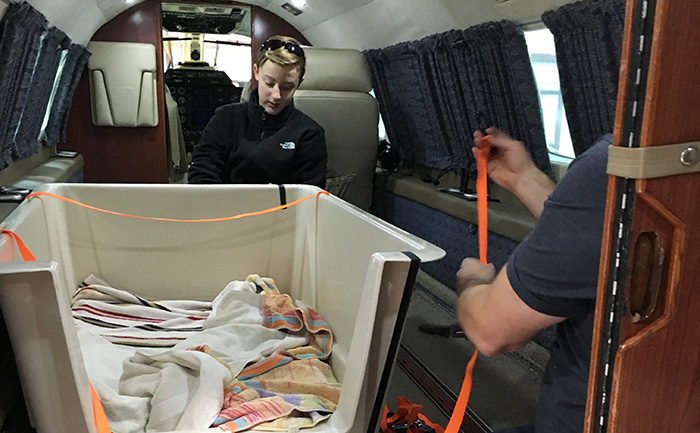
Jan. 17, 2018
Sea turtles stranded in freezing New England waters are receiving a helping hand from business aircraft operators, who fly these critically endangered species to warmer climates for the winter.
Thousands of vulnerable sea turtles have been airlifted to safety since Turtles Fly Too began coordinating with the general aviation community to transport “cold stunned,” or severely hypothermic, turtles to facilities in the Southeast where they are rehabilitated and released back into the wild.
Ken Andrews is among the volunteers who have donated their time and aircraft to Turtles Fly Too operations. He flew his first mission in December 2016 after unusual weather patterns resulted in mass sea turtle strandings off the coast of Cape Cod, MA.
When Andrews met Boston-based New England Aquarium staff at the airport, the Mitsubishi MU-2 Marquise he uses to bring his business to clients across the country was loaded with a different kind of cargo: 48 Kemp’s ridleys and two hefty loggerheads.
“It was a pretty surreal experience,” said Andrews, who signed up with his wife after learning about the organization from a pilot’s mailing list. “We got the call, and here we are three days later in Massachusetts packing up all these turtles.”
Sea turtles typically migrate to warmer waters after summer but a variety of factors, including weather patterns and human development, may cause them to be stranded in frigid Northeast waters for the winter. Conditions can be deadly for those left behind, but the efforts of volunteer pilots like Andrews give them a second lease on life.
“These rescue operations are only possible because of general aviation,” said Turtles Fly Too President Leslie Weinstein. “There are a lot of really great people in our industry and I can’t say enough about them.”

Weinstein, who also owns an aircraft fastener company in Boise, created Turtles Fly Too in 2014 after being alerted to the animals’ plight by scientists at the University of Florida Archie Carr Center for Sea Turtle Research. He’s taken advantage of connections made during a lifetime spent in aviation to build a database of over 500 pilots he can turn to when turtles need to be transported.
For Andrews, it was a unique opportunity to pay forward the benefits of the aircraft, which he credits for enabling his Michigan-based technology company to directly access its customers throughout the world.
“We built our business on having aviation, so we’ve always tried to give back,” Andrews said.
